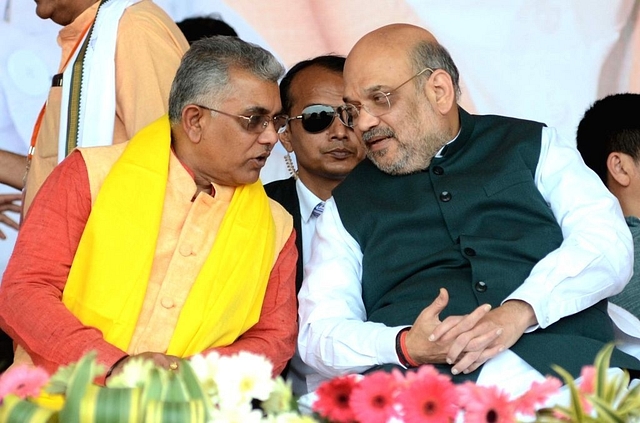
BJP Gets Its Strategy Right For Bengal Civic Polls, But All Depends On Booth Management On D-Day
With the BJP offering new hope to the people by inviting persons of repute to participate in its Bengal growth story, there’s a lot riding on the saffron party.
But the main challenge it will face is a possibly biased state election commission, which has often been partisan in its conduct, and an enabler of ruling party oppression.
The BJP in Bengal has firmed up an effective battle strategy for the forthcoming polls to 111 civic bodies, including the Kolkata Municipal Corporation (KMC), in the state.
Apart from the aggressive Aar Noi Annay (No More Injustice) campaign that the Union Home Minister Amit Shah launched at a rally in Kolkata on 1 March, the BJP is also readying a detailed manifesto for every municipality and municipal corporation that is going to the polls.
Also, the BJP will field mostly professionals — doctors, engineers, chartered accountants, academics etc — rather than career politicians in the civic polls. A large number of professionals have applied to the BJP for nominations.
BJP state general secretary Sayantan Basu said that priority will be accorded to reputable professionals who are popular in their respective areas while distributing party tickets for the civic polls.
These two measures — fielding such professionals and charting specific manifestos for each civic body — are the two positives of the BJP’s electoral strategy. Of course, the election campaign will also highlight the misdeeds and shortcomings of the Trinamool government, but the campaign will not be an entirely negative one.
“The Trinamool-run civic bodies have failed to deliver. They are all dens of corruption and civic amenities all over the state are in a mess. The Trinamool corporators and councillors are corrupt and are involved in tolabaji (extortions) and running syndicates. People have to pay bribes for every service and none of the civic bodies are functioning properly. We will highlight all this through a very strong campaign,” said BJP state president Dilip Ghosh.
But while doing so, the BJP will also tell the people what it intends to do in each municipal area, said Ghosh.
“We have taken inputs from local people in all municipalities and have prepared a charter of what we will do if elected to power in each civic body. We will tell the people of every municipal area what we will do in terms of improving civic infrastructure, civic amenities and civic engagement in their municipal areas,” Ghosh explained.
The application for party nomination from reputable people in all the municipal areas has kindled hope in the BJP.
“That professionals and reputable people, including public intellectuals and academics, want to contest as BJP candidates holds a lot of hope for us. We were pleasantly surprised to see that so many prominent and reputable people all over the state want our party tickets,” said party general secretary Basu.
While only a section of such professionals and reputable people who have sought BJP tickets are actively associated with the party, most only have a loose affiliation with the BJP.
“Many of those who have sought nominations are not even primary members of our party. Their desire to contest as BJP candidates not only indicates growing acceptability of the BJP among professionals and intellectuals of Bengal, but also growing disgust and disillusionment with the Trinamool,” said a senior state BJP leader.
However, all this will not necessarily translate into victories for the BJP. In the past, the Trinamool cadre has been accused of rigging the polls. If that happens, the BJP will have to marshall all resources and forces at its command to thwart the rigging machinery.
The Trinamool has been accused of preventing Opposition nominees from filing their nomination papers, indulging in violence to stop leaders and workers from campaigning and, on polling day, resorted to open rigging.
Civic (and panchayat) polls are conducted by the state election commission. All those manning the commission, including its head — the chief electoral officer — are state government appointees. And, thus, the commission has often been accused by the Opposition parties of acting at the behest of and favouring the ruling dispensation.
While polls in Bengal are always marked by violence and malpractices that are not witnessed in any other state, the state election commission persistently refuses to requisition and deploy central armed police forces (CAPF) like CRPF and BSF for poll duties.
In the absence of central forces, and with a pliant state police force manning polling stations and booths, violence, intimidation of opposition candidates and supporters, booth capturing and false voting have been a recurring feature of panchayat and civic polls in Bengal.
This time, too, it won’t be any different. And this is what the BJP has to prepare for. The saffron party faces the challenge of mustering enough support at the grassroots level to thwart the Trinamool’s rigging machinery.
In this task, the BJP can take a leaf out of the Trinamool’s book. In the 2011 Assembly polls, the Trinamool mustered enough support at the ground level to ensure that the CPI(M)’s infamous poll machinery was defeated. The BJP needs to adopt similar tactics if the polls are to be free and fair.
The BJP got comfortable leads in 45 of the 111 civic bodies in the Lok Sabha polls last year. In another 18, it came a close second to the Trinamool.
State BJP leaders say that the BJP has improved its position since then and can comfortably win at least 55 civic bodies, and has a fair chance of forming the boards in another 10 to 14 civic bodies.
But for that to happen, they agree, the polls must be free and fair. With little hope of the state election commission being able to ensure that, it is up to the BJP now to thwart the Trinamool’s dirty tactics. And that is the main challenge that stares at the BJP now.